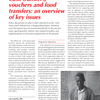Cash transfers, vouchers and food transfers: an overview of key issues
Policy discussions on what is often referred to as the ''cash versus food'' debate have a longstanding history. Such discussions have increased dramatically in the past few years, also in the wake of recent high food prices. The debate revolves around the identification and implementation of the most appropriate set of instruments, including cash transfers, vouchers and in-kind food transfers as ways to support vulnerable households in times of need. Cash transfer programmes provide people with money, while vouchers include the provision of coupons to purchase food for a fixed quantity or value in selected stores. Conversely, food transfer programmes provide people with imported or locally purchased food commodities.
The article reflects on the comparative advantages and limitations of each option - and thereby their appropriateness and feasibility in the light of five context-specific factors, including programme objectives, market conditions, implementation capacities, cost-efficiency, and beneficiaries' preferences.
Ugo Gentilini, PhD
World Food Programme - WFP
Rome, Italy
Ugo.Gentilini@wfp.org
The views expressed in the article are only those of the author and should not be attributed to WFP.




